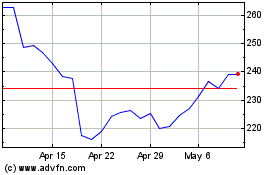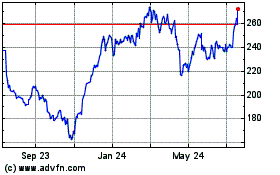Millennials stand out as being more cautious about their personal finances during COVID-19
June 29 2020 - 6:00AM

Equifax Canada analytic data and a recent consumer survey*
indicates that younger adults (18-34) stand out as being more
cautious and concerned about their financial future in the face of
the COVID-19 economic crisis.
Equifax data analytics confirms that, with reduced opportunity
for discretionary spending, younger adults have seen a higher rate
of decline in credit card balances since January at 16 per cent as
compared to under 12.6 per cent for those adults 35 and older.
Analysis also confirms that payment deferrals are being used more
frequently in younger groups with Under-24 and those 25-34 having
6.73 per cent and 6.69 per cent accounts deferred respectively.
This contrasts with 5.2 per cent for the 45-54 cohort.
To better understand consumers today and for the
future as the economy and businesses reopen, Equifax Canada is
teaming up with BEworks, experts in behavioral economics. After
examining the consumer confidence data and survey research, Kelly
Peters, CEO & Co-Founder of BEworks, suggests that younger
adults in particular are less susceptible to the scarcity mindset
driving other consumers.
“COVID-19 has created the perfect storm for Canadians to
experience a scarcity mindset. A feeling of not having enough, be
it time, money, or social companionship can exert a toll by taking
mental energy away from financial decision-making and making it
more likely for cognitive biases like loss aversion and present
bias to drive financial behaviours,” said Peters. “Despite these
challenges, there are psychological silver linings to the pandemic,
including that for many Canadians new and different financial
behaviors have emerged, and old habits have loosened their grip for
a time. By proactively leveraging behavioural insights, financial
Institutions can take advantage of the unique times we are living
in and help consumers make a fresh start in the post-pandemic
world.”
Millennials and their financial concerns about
COVID-19
|
% Who Agree with Survey Statements |
Millennials (18-34) |
35 and Older Respondents |
|
My job feels less secure because of COVID-19 |
42 per cent |
25 per cent |
|
I’m limiting my spending because I’m already carrying too much
debt |
41 per cent |
32 per cent |
|
I will apply for an additional credit card to help pay my
bills |
13 per cent |
5 per cent |
|
I’m concerned about my ability to keep up with my rent/mortgage
payments |
30 per cent |
17 per cent |
|
I may need to move because I cannot keep up my rent/mortgage
payments |
14 per cent |
7 per cent |
|
The government assistance I’m receiving won’t be enough to cover
all of my bills |
25 per cent |
18 per cent |
|
I will need to turn to friends and family for money |
20 per cent |
9 per cent |
Looking across all age groups, understandably survey respondents
are most concerned for their own financial situation, but there’s
also a good measure of concern for their friends, country and
family dealing with the pandemic that has gripped the world.
Nearly four-in-ten (37 per cent) are concerned about their own
financial situation, while 33 per cent are concerned about the
financial impact on their country, 26 per cent are concerned about
their children, 21 per cent are concerned about their parents and
17 per cent are worried about their friends.
“Anxiety over finances is something not limited to the COVID
period as we saw in a survey last fall indicating that 45 per cent
of millennials felt concerned about their current debt levels as
did 49 per cent of those aged 35 to 44. What is encouraging in this
research is that we see that Canadians are turning to friends and
family to discuss and share approaches to finances and offer
support during difficult times,” said Carrie Russell, President of
Equifax Canada. “We know that some people are facing greater
hardship than others, driven by large household indebtedness and
historically low savings rates. It’s important for people to have
meaningful conversations about money, expenses, deferrals and
payment plans. At a time when we are physically farther apart, the
pandemic has in a way brought us closer together, with a sense of
optimism, support and resiliency.”
Nearly half of survey respondents (47 per cent) expressed
optimism in saying that, “I’m confident my personal household
finances will stabilize in the next six months.” Nearly
three-in-ten of those surveyed disagreed with this statement and
one-quarter were unsure. Those in B.C. are more likely to say they
agree (54 per cent) with this statement compared to those in the
Prairies (46 per cent), Ontario (45 per cent), and the Atlantic
provinces (39 per cent).
Tracking expenses and understanding credit
When asked about their expenses 20 per cent of those surveyed
said that the government assistance that they were receiving wasn’t
enough to cover their bills. People are cutting back too; 20
per cent indicated that they have cut back on digital subscriptions
like Netflix, Amazon Prime and Spotify. Looking ahead to when
stay-at-home restrictions are lifted, 11 per cent said they won’t
be able to afford the fees for their kids to play sports or take
part in extracurricular activities.
In asking about their thoughts and feelings about credit, 69 per
cent of all survey respondents indicated that they feel comfortable
talking about credit, whereas 31 per cent feel stressed talking
about credit. With respect to credit scores, 72 per cent indicated
they understand that their credit scores impact them financially,
while 28 per cent also said there was a social impact. On the
matter of checking credit scores, 60 per cent appreciate the
importance of routinely checking credit scores versus 40 per cent
who indicated it’s more important to check scores when receiving a
credit monitoring alert.
To help better understand how the pandemic may be impacting
their finances and credit, consumers are encouraged to visit the
COVID + Credit Resource Centre. The Centre provides insights on
managing finances and steps to mitigate negative impact on their
credit during these difficult times. Consumers concerned about
deferred payments and the potential impact on their credit scores
will also be able to find guidance and helpful information.
* Equifax surveyed 1,536 Canadians ages 18-65, May
29-31. A probability sample of the same size would yield a margin
of error of +/- 2.5%, 19 times out of 20.
About Equifax Inc.Equifax is a global
information solutions company that uses unique data, innovative
analytics, technology and industry expertise to power organizations
and individuals around the world by transforming knowledge into
insights that help make more informed business and personal
decisions. Headquartered in Atlanta, Ga., Equifax operates or has
investments in 24 countries in North America, Central and South
America, Europe and the Asia Pacific region. It is a member of
Standard & Poor's (S&P) 500® Index, and its common stock is
traded on the New York Stock Exchange (NYSE) under the symbol EFX.
Equifax employs approximately 11,000 employees worldwide. For more
information, visit Equifax.ca and follow the company’s news on
LinkedIn.
Contact:Andrew FindlaterSELECT Public
Relationsafindlater@selectpr.ca(416) 659-1197
Tom CarrollMedia RelationsEquifax
CanadaMediaRelationsCanada@equifax.com (416) 227-5290
Equifax (NYSE:EFX)
Historical Stock Chart
From Mar 2024 to Apr 2024

Equifax (NYSE:EFX)
Historical Stock Chart
From Apr 2023 to Apr 2024
